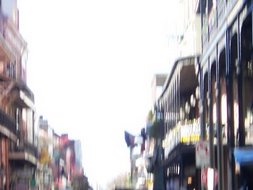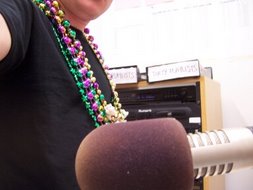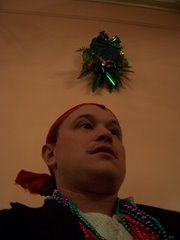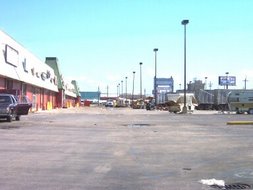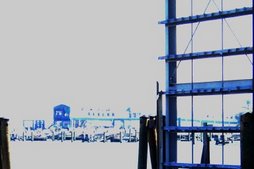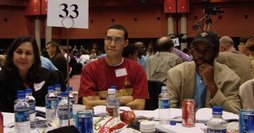
"They lied."
He held a $6 beer in one hand, a faraway look in his eye, the mournful tone in his voice deep as a thousand years. With those resigned words he moved on, the early evening blue of summer bathing all of us through the arena's wide windows.
This ain't right, we agreed. This is bullshit. You don't break a promise for dollar beers in New Orleans in June and get away with it.
Someone's gotta pay.
*******************************************************************
As humidity settles in and brings
tempers nose-to-nose with the brink, and
most of life shrugs along in a sweaty crawl, blog time suffers in N.O.N. Yet, not unlike deepest winter in the North, summer in New Orleans does afford time and isolation for study and plotting. And so we'll recommit ourselves to the task, even if the heat threatens to commit us to a different, air-conditioned asylum.
What's been going on in the meantime, in no particular order....
******************************************************************

Thursday, June 28th
Main man Ron Hitley of
Hornets247.com and I attend the Hornets draft party at the Arena, a teal n' gold circus/viewing party for families and hardcore fans with 5 cans of food or 5 bucks.
Upon entry, we mill around in the empty stands, then make our way to the concession counter for the much advertised (and greedily discussed) dollar beers and food. A Hornets employee sees the lengthening line and tells us another counter is open down the way. When we get there, the women behind the counter are informing people that beer is six bucks, pointing to the menus as proof.
"It says it right here!" a man cries, gesturing wildly at one of the TV monitors. I have a flier in my hand backing this up, and check again to make sure I didn't imagine it.
"Not today," one of the women replies. I guess no one thought to inform the actual sellers of these beers that today was a special event. I mean, that's not a priority or anything, right? And if you think a piece of paper or some TV screen is going to change their minds, I bet I can tell you where you got your shoes.
Back at the next counter, we meet the "They lied..." gentleman and can't believe this is happening. Ron's a bigger Bees fan than I am, so he's amped just to be here, but I'm getting heated, hungry, and thirsty. I'm too impatient to wait while the other kids make their signs at the Make A Hornets Sign table, but if I wasn't, well, there'd be some magic-markered choice words for management.
We walk down to the tunnel for our tour of the locker rooms and inform all staff present that a potential riot situation is developing upstairs.
A half-hour later when we end the tour, this heinous abberation has been erased and the beer flows freely. Ron and I drink the watery stuff hand over fist, the Hornets steal Julian Wright with the 13th pick, and confetti falls on all 300 of us. We stagger out into the evening heat.
Summertime.
*******************************************************************
 Wednesday, June 27th
Wednesday, June 27thFor years I've wondered what it would be like when the day came and went, how the end would feel, how I would handle the change. Today, the inevitable happened, and I bore silent witness to a passing era.
Tony Blair stepped down as UK Prime Minister, ending
a decade in power and handing a flickering flame over to the grayer grasp of Gordon Brown. Retrospectives and a farewell tour played out in the shadow of Iraq, casting everything in anticlimax and bitterness, half-hearted qualifications of the
central failure, instantly faded
memories of
successes that will never add up to a positive legacy.
Down here, I smiled to myself and thought back. Five years ago, I started something called Tony Blair Presents. My friend Edna Leshowitz and I ran a performance series in the basement of a
M Shanghai Bistro in
Williamsburg,
Brooklyn for a little over a year, bringing in friends of ours with reputations big and small to entertain whomever showed up. Why "Tony Blair?" everyone asked. Cause, we'd say, we're LOYAL. No matter how bad they were, no matter how wrong, we'd stick by our friends, to our own detriment, just like the-man-himself.
Around about the time that ended, I started dj'ing on
East Village Radio as DJ Tony Blair, later
DJ Toney Blare. From a booth on 1st avenue & 1st street, I brought in a lot of different musicians--xylophonists from Guinea, rappers from Harlem, flutists from France, even a pop group from England--and some of my poet and actor friends. My man RD and I read half of Waiting for Godot in there, and I dj'd while like 30 people watched cats freestyle on the sidewalk. We did it right there on the ave every week, slightly unhinged and ramshackle and blazed, two hours in a fishbowl, real street-level shit. Bagpipe players and homeless dudes did cameos and I balanced things as much as I could.
And the funniest thing was, half the people who came through there only knew me as "Tony." I'd pick up comp tickets left for Tony Blair, get lauded in Time Out New York as
Toney Blare, and introduce myself like, "Hey, I'm Toney." Whenever something extraordinary happened to the PM, people would ask me what I thought, and I usually knew something cause I'd read the London Times and the Mirror (your real source should be
Blairwatch and my man Quarsan) every week. But I swear to god, there were people I was damn good friends with, chilling on a weekly basis, who only knew me as Tony. It felt weird and subversive, heavy on the weird.
Mostly, people would ask what I was going to do when Tony was gone. I'd blow them off, say I didn't give a fuck, say I was gonna be DJ Vlad Putin, or some such comment. It's just an alias, after all, and as I started to distance myself from irony and the useless satire of so many war "critics," I translated the name as "a plush blast," or something to do with Ghostface Killah and horns.
But now he's done and I'm in New Orleans with a clean slate and a hip-hop show for the summer, buried in a student union basement but plugging onward. When the day finally came, I looked back at all that Tony/Toney shit for the first time, really considered things. And I know I came out a lot better than he did.
And will keep on being Toney Blare. Check us out every Friday morning at midnight-2am this summer, 91.5FM in New Orleans.
******************************************************************
Thursday, July 4th
A full-fledged deluge breaks open as we drive down Judge Perez Highway in St. Bernard Parish on Independence Day. The ruins and re-starts turn into a watery gray blur. Middle-aged Man rides shotgun, Kim and Ron Hitley are in the back, and I warily drive the Windstar through the storm.
"Picture this times ten."
"Times a thousand."
"Man."
On this American Birthday Party, I fight against hydroplaning in the middle of a devastated landscape of strip malls and housing developments. While the Lower Ninth Ward gets most of the spotlight, St. Bernard grunts and hammers, climbs up from a hole left by 10' flood waters. Judge Perez, namesake of this road, was a segregationist ward boss, most of the parish is lower to middle class whites, and most of the houses are squat, ranch-style affairs. This is more like America, less like the New Orleans in the nation's mind's eye.
Perhaps that's why no one talks about it--it's too close to places where people think they're safe from government-supplied disaster.
Kim and I come out here once in awhile to see friends of ours who lost everything in the storm and still live in a FEMA trailer. They came out on-top in a way, though, parlaying their insurance and saved-up cash into a much bigger house on serious discount. Today's the first time they'll swim in their pool.
Though the rain isn't feeling sentimental. We all sit under the giant carport and down cans of beer, get wet from the spray of the storm, eye the clouds and the pool, back and forth.
The United States, 2007: lite beer in a ruined neighborhood, the levee in plain view, renovations at a holiday standstill, a deserted house next door.
Finally the rain dies down and our friend Carl, new owner of this mansion with a gutted first floor, jumps into his pool for his first swim. Right about now, he doesn't give a shit about the rain, or the Storm, or anybody else's problems. The pool is something new and great, and to hell with dark clouds or hesitation.
One by one, everyone takes a turn in the pool. The
Pirate's there with his red contacts in and his wife, too, and a giant plant strapped to the roof of their car. Middle-aged Man and I are there, together like we were last year for the 4th in Astoria Park. Kim slides down the slide and lands on top of an inflatable whale, rides it like a champion. Hell, even non-swimmer Ron Hitley gets on a raft and paddles around. Carl's buddy, Trouble, is there with a woman and her son, who's 15 and smoking reds, straight-up, bra. And Anne Marie from Ulster, Carl's wife, finally gets to be Barbie in her mansion.
I can't always define this place, this time, this way of life in the early 21st century, in these plains of nightmare and resurrection.
But I did walk into the gutted garage, to use the little bathroom with no walls. And there was the Pirate, taking a dump. He gave a big laugh.
It ain't Norman Rockwell, but it sure is America, alright.
.












